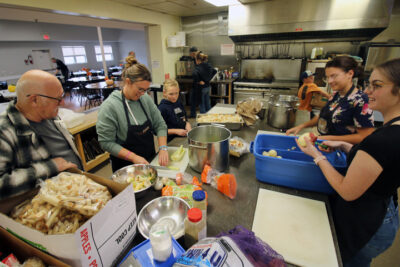Soup kitchen crusades against food waste
By Lethbridge Herald on November 8, 2025.
 HERALD PHOTO BY JOE MANIO
Lethbridge Soup Kitchen executive director Bill Ginther (left) has been dubbed the "king of recycling" there. It's daily operations the Soup Kitchen strives for "zero wasted food - zero food waste." No food goes into the garbage. All food waste is either earmarked for composting or destined for animal feed.
HERALD PHOTO BY JOE MANIO
Lethbridge Soup Kitchen executive director Bill Ginther (left) has been dubbed the "king of recycling" there. It's daily operations the Soup Kitchen strives for "zero wasted food - zero food waste." No food goes into the garbage. All food waste is either earmarked for composting or destined for animal feed.Joe Manio
Lethbridge Herald
Local Journalism Initiative Reporter
Food waste is a significant issue in Canada with over 58% of the food supply being wasted or lost annually, amounting to 11 million tonnes; which has major environmental, economic, and social consequences including high costs for households and businesses, a contribution to greenhouse gas emissions.
“Globally, 2.5 billion tons of edible food is wasted or lost every year on the average,” says Lethbridge Soup Kitchen executive director Bill Ginther. “Consumer waste in Europe and North America is between 95 and 150 kilograms every single day on average.”
Considering the number of Canadians going hungry on a regular basis, the co-existence of significant food insecurity and massive food waste is both ironic and nothing short of a travesty.
“Canadians create about 50 billion tons of food waste every year, despite 60% of it being avoidable through better planning and awareness,” says Ginther.
While specific numbers for Lethbridge are not readily available, provincial data shows that Alberta has a high rate of food insecurity, with 30.9% of the population experiencing some level of food insecurity in 2024, and 8.7% facing severe food insecurity.
Nationally, food bank visits are at historic highs and increasing, and local food banks in Lethbridge are also reporting significantly increased use, reflecting the broader provincial trend of worsening food insecurity.
Unfortunately, food waste is a major component of our modern “throw-away society” which is fundamentally driven by consumerism, the overabundance of cheap goods and a culture that prioritizes convenience and novelty over durability and reuse.
Food waste in landfills creates significant environmental impacts, including producing methane, a potent greenhouse gas, and wasting the resources used to produce it, such as water, land, and energy.
When food decomposes in a landfill’s oxygen-deprived environment, it releases methane, contributing to climate change. Throwing away food also wastes all the resources involved in its lifecycle, from farming to transportation.
For its part in the battle against food waste, Ginther and the Lethbridge Soup Kitchen strive for a “no wasted food – no food waste” model in its daily operations.
“I’ve been known to take things immediately out of the garbage if it shouldn’t be there,” says Ginter, talking about anything “compostable” or “recyclable” that can be diverted from the landfill. He says he’s been dubbed “the recycling king.”
During their recent Thanksgiving supper, where the Soup Kitchen fed hundreds of guests, any leftover turkey and fixings were immediately placed in containers for delivery to other organizations than needed food (including food banks).
Nothing organic went into the garbage. Any other food scraps were destined for composting or slated to become animal feed (for hogs in particular).
“No food waste ever goes to the garbage. Any food waste is picked up by local farmers and they often exchange a market size hog at a certain point; for providing food for them pretty well every day,” says Ginther.
To combat food waste on a personal level, individuals and households can focus on smart shopping and meal planning, proper food storage, creative cooking with leftovers, and composting unavoidable scraps. These actions help save money and reduce the environmental impact of wasted food.
The benefits of more people combating household food waste include significant financial savings for households, reduced environmental impact from wasted resources and landfill methane, and finally improved food security through more efficient use of food resources.
This collective effort strengthens food systems and communities by saving money, conserving water and energy, and lessening pollution.
19-18





[…] https://lethbridgeherald.com/news/lethbridge-news/2025/11/08/soup-kitchen-crusades-against-food-wast… […]